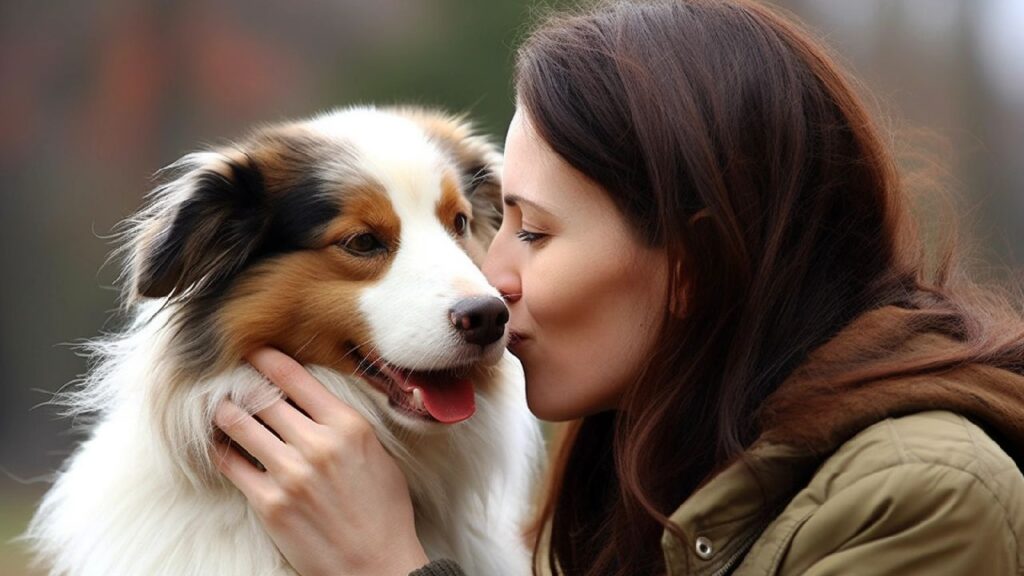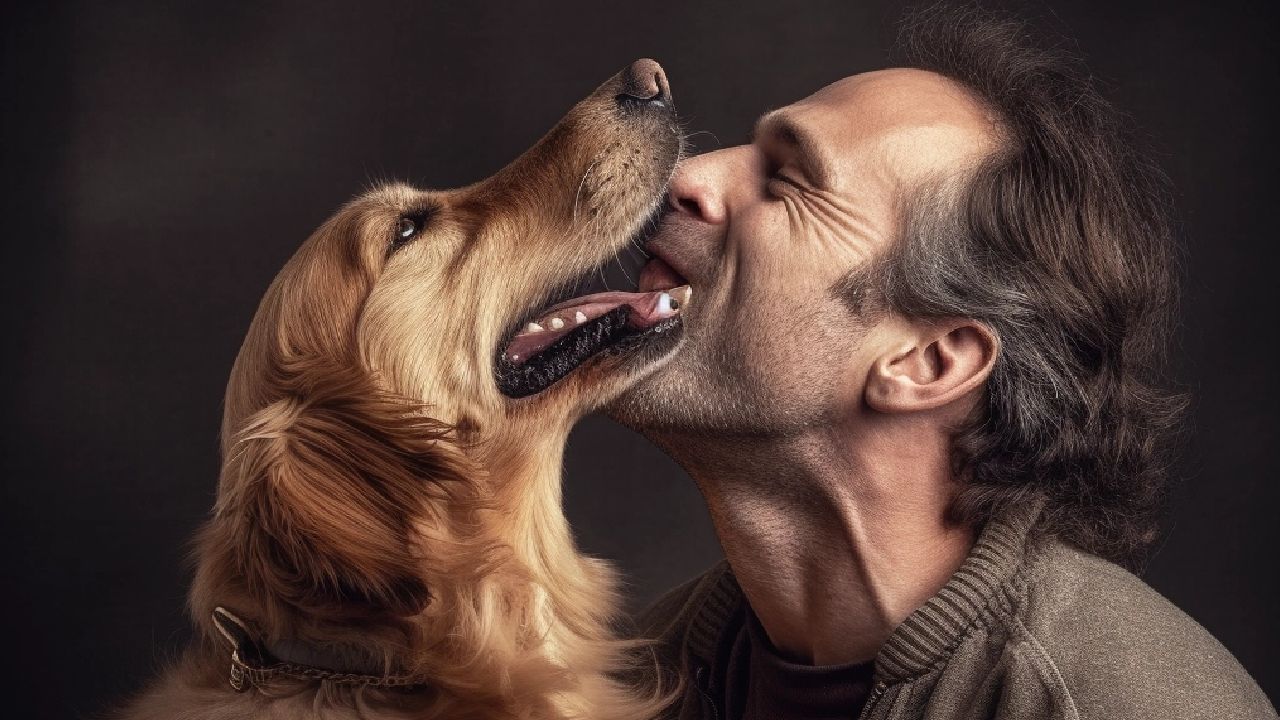Centuries ago, the bond between humans and dogs remained steadfast. Among the behaviors that underline this connection, dog licking emerges as a complex phenomenon.
This article delves into the multifaceted motivations behind dogs’ licking behavior toward humans, evolutionary history, neurological aspects, and social dynamics.
Why Do Dogs Lick People
Dogs communicate their emotions in various ways, and licking is one of their primary methods. From heartfelt affection to ancient instincts, understanding their motivations helps deepen your bond.
Affection
Licking is often a display of affection. Your dog views you as part of their pack and uses licking to show love and closeness. It triggers the release of oxytocin, the “cuddle hormone,” in both you and your dog, fostering a stronger connection.
Neurological Underpinnings
Neurological research suggests that licking may activate reward centers in the brains of both dogs and humans. Oxytocin, often called the “love hormone,” is released during positive social interactions and is associated with bonding.
Studies indicate that oxytocin levels increase in both dogs and humans during mutual gaze and physical contact. It’s plausible that licking behavior triggers oxytocin release, solidifying the emotional connection between dogs and their human companions.
Contextual Factors
The context in which licking behavior occurs is pivotal in its interpretation. Dogs may lick humans after meals due to the residual taste of food. Licking may also serve as a coping mechanism during anxiety or stress. Understanding the specific circumstances surrounding licking can provide insight into the underlying motivations.
Evolutionary Origins
Understanding the evolutionary roots of licking behavior necessitates an exploration of dogs’ ancient lineage, stemming from their origins as descendants of wolves. In the intricate social structure of wolf packs, licking holds paramount significance as a fundamental mode of communication.
Among wolves, adult pack members engage in grooming activities, mainly directed at wolf pups, demonstrating care and fostering bonds. As the trajectory of evolution led wolves to transform into domesticated dogs, this grooming behavior remained deeply ingrained.
Once reserved for inter-wolf interactions, licking became a mechanism for connecting and communicating with humans. Hence, licking in dogs becomes a fascinating embodiment of ancestral adaptation. It serves as a bridge that spans across generations, linking the ancient wolf packs to modern-day human-dog relationships.

Reasons Why Your Dog Licks You
Dogs have fewer taste buds than humans, and their taste preferences are more geared toward their survival and dietary needs rather than the wide range of flavors that humans can appreciate.
Basic Taste Sensations
Dogs can detect the basic taste sensations of sweet, sour, bitter, and salty, but their tastes differ significantly from ours. For example, dogs are less sensitive to sweet flavors and more sensitive to the taste of meat and fats.
Preference for Smell
While taste is essential for dogs, their sense of smell plays a much more significant role in their perception of food. Dogs have an incredibly keen sense of smell and often rely on their sense of smell to assess the flavor and quality of food.
Dietary Instincts
Dogs’ taste preferences are closely linked to their evolutionary and dietary needs. They are more likely to be attracted to foods high in protein and fat, as these nutrients are essential for their energy and health.
Variability
Just like humans, individual dogs have their unique taste preferences. Some dogs might be more open to trying different flavors, while others might be more selective.
Is It Safe for Dogs to Lick You?
In most cases, a dog’s lick poses no harm. However, be cautious if you have open wounds or sensitive skin. Dogs can inadvertently transfer bacteria through licking. Maintaining good hygiene and discouraging licking of sensitive areas is advisable.
When Licking Can Be a Problem?
While licking is typically harmless, excessive licking can indicate underlying issues. Allergies, skin irritations, or anxiety might be contributing factors. If you notice persistent licking, consult your veterinarian to ensure your pup’s well-being.

How To Stop Problem Licking?
If your dog’s licking becomes excessive or problematic, there are steps you can take:
Understand the Motivation
Before addressing the issue, it’s crucial to understand why your dog licks excessively. Is it a form of affection, anxiety, or boredom?
Positive Reinforcement
Reward your dog when they display calm behavior without excessive licking. Praising and treating them when they keep their licks in check helps reinforce the desired behavior and establishes a positive association.
Offer Distractions
Redirect your dog’s attention by providing engaging toys or puzzles. Mental and physical stimulation can help alleviate boredom or anxiety, possibly driving the licking behavior.
Set Boundaries
Teach your dog appropriate boundaries. When they start to lick excessively, gently guide them away or use commands like “no lick.” Consistency is vital; your dog will understand when their licking is unwanted over time.
Maintain Good Hygiene
Keep your skin clean and dry to reduce the appeal of licking. If your dog associates your skin with taste due to residual scents, they might lick more. Regular grooming and practicing good hygiene can discourage excessive licking.
Practice positive reinforcement
When they display calm behavior and provide ample physical and mental stimulation to reduce anxiety-related licking.
Conclusion
While your dog’s licks are often a sign of affection, managing excessive licking is essential for your comfort and well-being. You can guide your dog toward more balanced behavior by understanding the root cause, using positive reinforcement, providing distractions, setting boundaries, and maintaining hygiene.

FAQs
Can I stop entirely my dog from licking?
It’s unlikely to eliminate licking entirely, as it’s natural. However, you can manage and redirect excessive licking.
How long does it take for these steps to show results?
Results can vary based on your dog’s temperament and the underlying cause of licking. Consistency and patience are key.
What if my dog licks due to anxiety?
If anxiety is the root cause, consult a professional dog trainer or veterinarian for tailored advice and potential solutions.
Should I punish my dog for licking?
Punishment is not recommended, as it can create fear and confusion. Focus on positive reinforcement and redirection.
Are there specific products to discourage licking?
Some products, like bitter-tasting sprays, are designed to deter licking but may not address the underlying cause. Consult a professional before using such products.






0 Comments